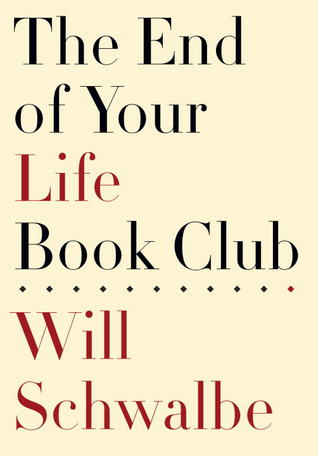We're all in the end-of-your-life book-club, whether we acknowledge it or not; each book we read may well be the last, each conversation the final one.
In 2007, Will Schwalbe's 73-year-old mother Mary Anne -- a woman with a career that included being both the Director of Admissions at Harvard and the founder of the Women's Commission for Refugee Women and Children -- returned from a humanitarian mission in Kabul, and despite not feeling well (which wasn't unusual when she returned from visiting refugee camps), she took some convincing to see a doctor. What was originally diagnosed as a rare type of Hepatitis (perhaps Hep-D or even -E) turned out to be pancreatic cancer, and due to the delay in diagnosis, had spread and was inoperable by the time it was discovered. Accompanying his mother to chemotherapy for the first time, Will casually asked, "What are you reading?", and without really planning it, the mother and son began a two person book club, using the long hours at the hospital to discuss the books they decided to read together. Between the incredible career of Mary Anne Schwalbe, her untimely death, and a discussion of books, I thought that this would be a touching and interesting read, but somehow, The End of Your Life Book Club just missed the mark with me.
I felt very little connection to Mary Anne -- Will provided cursory biographical information, and while he gave the titles of her various positions, he didn't get her to talk about her career or otherwise give any insight into what these jobs were actually like. He did share a few of her favourite (and most dangerous) experiences when trying to get his mother to talk about courage, but as these were her cocktail party stories, they were rehearsed and not spontaneous; totally lacking in emotion. And if Mary Anne comes off as an imponderable paragon in her public life, the private time they share is filled with her speaking in platitudes ("you need to tell the people that you love that you love them every day") or her leaving Will to go hold a stranger's hand or buy someone's cancer meds for her. As Mary Anne knew that Will intended to write a book about their experience, and since she was a notorious control freak (she even wrote updates for Will's blog about her health; in his voice; for him to post; which he would never amend), I'm assuming that it was her decision for this book to be used to call for health care reform and to cheerlead for the election of Obama. (And as a Canadian, that's a totally non-partisan complaint -- this recurring agenda was a distraction that further kept Mary Anne at arm's length from me.)
As for the books, there were 109 titles mentioned (happily, Mary Anne lived with her pancreatic cancer for much longer than the average patient), and as that number suggests, they weren't discussed in any great detail. In fact, the book discussions served neither to particularly convince me to read what they were reading nor did they serve as a launching point for intimate mother-son discussions. In fact, while discussing some book or other, Will really wanted to blurt out, "I love you", but he chickened out and it came out, "I'm really proud of you", and that counts as one of the most touching moments in this book.
And then there were just weird scenes like when Will said he was uncomfortable when people would ask him how he was holding up because he felt that, while there's a respected tradition of close father-son bonds, it's just "gay" for a son to be seen to be too close to his Mom (and he said this despite being an openly gay man).
Because of its subject matter, it's really hard to say that I didn't like this book, but I suspect it never would have been published if Will Schwalbe hadn't spent 20 years in publishing. The End of Your Life Book Club feels like a marketing ploy, designed to appeal to readers for all the reasons I thought that I would like it, but without pulling off the concept (which feels horrible to say, because someone actually did die here). This book is an insufficiently realised valentine from a son to his mother that may have been better kept as an in-family document (except for the way that, I suspect, its publication made Will Schwalbe a millionaire author…)
Mom taught me not to look away from the worst but to believe that we can all do better. She never wavered in her conviction that books are the most powerful tool in the human arsenal, that reading all kinds of books, in whatever format you choose -- electronic (even though that wasn't for her) or printed, or audio -- is the grandest entertainment, and also is how you take part in human conversation. Mom taught me that you can make a difference in the world and that books really do matter: they're how we know what we need to do in life, and how we tell others. Mom also showed me, over the course of two years and dozens of books and hundreds of hours in hospitals, that books can be how we get closer to each other, and stay close, even in the case of a mother and son who were very close to begin with, and even after one of them has died.


